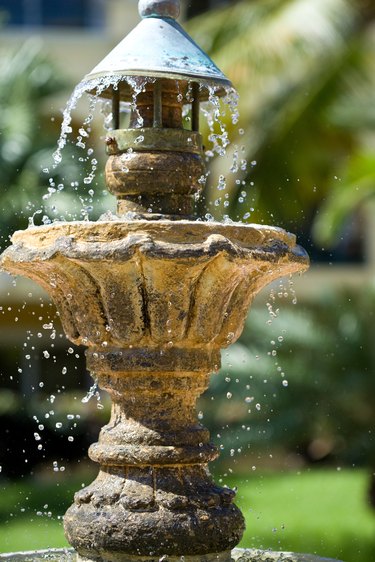
Outdoor fountains are not designed to be used in freezing temperatures. It is best to bring your outdoor fountain inside for the winter if possible. A garage, basement or shed will do as long as the fountain is protected from freezing weather. If your fountain is too heavy or too large to store indoors during the winter, make sure you take proper precautions, before the first freeze, to protect your fountain from winter damage.
Remove Parts
Video of the Day
If you can't move your fountain indoors for the winter season, drain the fountain completely. Remove the pump, the stopper, the drainpipe and any other small, removable components and store them inside. Clean out the pump and store it in a container of water to prevent the seals from drying out over the winter. Turn the bowl portion of the fountain upside down to prevent water accumulation. If water accumulates in any part of the fountain and subsequently freezes, the water will expand and crack the fountain.
Video of the Day
Dry It
Thoroughly dry the entire fountain. Most fountains can be left in freezing weather, provided they are completely dry. Any moisture left, when the fountain freezes, can result in damage because any slightly porous material is susceptible to cracking and chipping when water expands along its surface as it freezes.
Protect It
If you can lift the fountain, place it on boards or blocks to prevent the fountain base from freezing to the ground under it. Cover the fountain with an absorbent material, such as towels or burlap, then wrap it securely with heavy plastic. Tie the plastic on with twine to keep it in place during windy winter weather.
Warnings
Most outdoor fountains are concrete or pottery, which are porous materials. If any moisture seeps into the concrete or pottery and freezes, cracks and chips will likely occur as a result. Check your fountain cover frequently to ensure that no tears or leaks have developed that would allow moisture to reach the fountain. Do not add any de-icing product or chemical antifreeze to a fountain. It will not prevent winter damage, but it will pose a serious health risk to children, pets and wildlife.